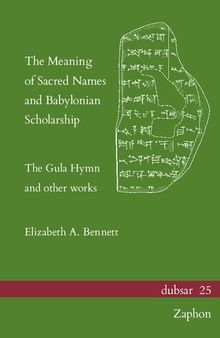 جزییات کتاب
جزییات کتاب
This book explores the remarkable ways by which Babylonian scholars in the second and first millennia BCE understood the names of their gods and goddesses and the places sacred to them in a wide spectrum of texts, ranging from explanatory lists to great religious works. Developing and expounding their religious thinking, these extraordinary scholars elucidated the meaning of sacred names, both obvious and hidden, by etymological and other means, using great erudition, sophistication and invention. Using a substantial text corpus, this study enlarges on the understanding of the ancients' explanatory approach, which has been previously observed by modern scholars in individual works. The compositions examined here display scholarship that is erudite and highly inventive, making flexible associations in the search for meaning. Tantalising indications of the influence of the spoken word can perhaps be detected in this scholarly written tradition. While previous studies have focussed on the etymological approach of this form of scholarship, this book demonstrates that other, less common, speculative methods are also at work. The detailed classification of the scholars' speculative methods may inform and provoke further analysis of Babylonian scholarship, a field which is not confined to the explanation of sacred names but has wider application, most particularly in the lexical corpus and the omen tradition and in commentary texts. It is a key tool in the quest for meaning which characterises Babylonian thought.



 دانلود کتاب
دانلود کتاب

 جزییات کتاب
جزییات کتاب





 این کتاب رو مطالعه کردید؟ نظر شما چیست؟
این کتاب رو مطالعه کردید؟ نظر شما چیست؟
